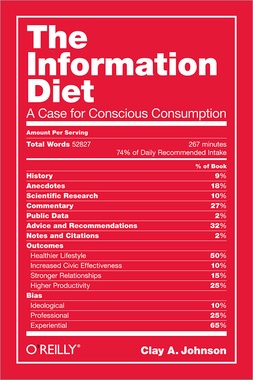Clay Johnson is the founder of Blue State Digital which was the company that built and ran President Obama’s campaign for presidency in 2008. But, hold on you conservatives; Johnson does a decent job of keeping many of his political views out of this book. Instead of following our information bias and catering to it, Johnson suggests that we challenge our ideas and also get to the bottom of the “information trophic pyramid.” A trophic pyramid is basically a way to describe an ecosystem with the primary producers at the base (where the most energy is stored) with smaller groups of consumers at the top. Johnson uses this model to describe how our “information diets” need to be shaped; we need to grab our information as close to the source as possible and synthesize it for ourselves.
The poor diet analogy
Johnson says that our information diets are made up of too much entertainment and information that affirms what we already believe (mass affirmation) and he compares this to your poor American diets. We consume whatever “tastes the best” and almost ignore everything else. It’s a good analogy, comparing and criticizing our standard American diet, one of too many bad fats, processed carbs, and not enough “real” ingredients, but after several chapters of building up the analogy I almost felt that I needed an information diet from The Information Diet. That may be harsh, but the historical information about how our food is processed is nothing new and I feel that Johnson could have written less about food and more about how we should process information as well as the best places to get it.
How to consume information
In the second part of the book, Johnson goes on to explain how we should consume our information. He simplifies it the most saying that we should, “Consume deliberately. Take in information over affirmation.” This is a great quote to remember as we go through our day, but can be a bit simplistic for someone that wants to totally revamp the way that they consume and process information. That may be the point, but it feels that Johnson took this simplistic approach almost too far and left out a lot of information in this section of the book making it quite open-ended for the reader. The chapters that actually contained “The Information Diet” felt too short and gave a lot of tips and tricks about obtaining, consuming, and spending time with our information that have been old hat for many information workers and creators. Johnson suggests consuming information that is as close to the source as possible, lacks a strong bias, and that we consume this information deliberately throughout our day by following a a schedule. Johnson considers basically anything that we watch through a screen as a form of information and that we should try very hard to stick to around 6 hours to that type of consumption a day, leaving the rest for time to create and spend quality time with friends and family. Johnson also recommends some great tools for keeping track of your time like RescueTime and also tools for making your web reading better and less advertisement-prone like Instapaper and Readability.
Getting involved
One of my favorite portions of the book is the “Dear Programmer” section (probably has nothing to do with me being a developer) where Johnson makes a call out to developers to try to get involved in creating tools that help citizens dicipher complex information and help out local governments with creating tools and services that make them more efficient. I believe that Johnson could have devoted even more time to this in the book, but it appears that his website is going to help with pushing local “Information Diet” meetup groups where developers and creatives can get involved. Johnson also recommends getting involved with the group Hacks/Hackers which is a group that tries to connect journalists (hacks) and developers (hackers) to work on joint ventures and ways to create better outlets for media.
Conclusion
The Information Diet is definitely the kind of book that we need to read going into 2012 with all of the junk information online and on our TVs trying to creep into our lives and not making us think critically. Johnson makes a good argument of why we need to get our information closer to the source and how to manage our time when it comes to consuming it, but I feel that there is too much discussion of food and how it relates to our information diet. I understand that Johnson is trying to make his point and view a stronger one, but more time could have been spent in the second and third sections of the book explaining how we need to critique the information that we consume. Should you buy the book? For a measly $10 for the Kindle version, I think that the Information Diet has more good information in it than not, with the second and third sections of the book being the most practical.
